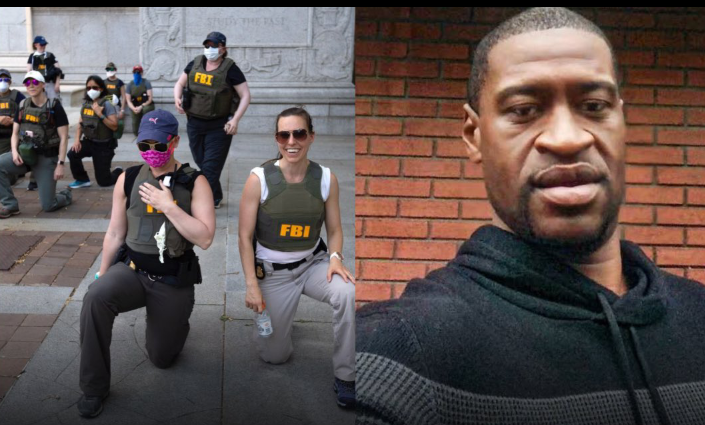
BREAKING NEWS: FBI Fires 20 Agents Over George Floyd Protest Kneeling Scandal

The Federal Bureau of Investigation has ignited a political firestorm after dismissing about 20 of its agents, including at least 15 who were linked to one of the most symbolic and controversial moments of the George Floyd protests in 2020: the act of kneeling alongside demonstrators. The move, confirmed through sources familiar with the matter, comes after an internal review by the FBI’s inspection division and subsequent vetting by the bureau’s general counsel’s office. The FBI itself has declined to comment officially, leaving speculation, outrage, and bitter division to dominate the public discourse.
The incident in question took place in Washington, D.C., at the height of nationwide protests that erupted after the k*lling of George Floyd by a Minneapolis police officer. Millions poured onto the streets across America, demanding racial justice, accountability in law enforcement, and systemic change. Images of the kneeling FBI agents, mirroring a gesture popularized by athletes and activists as a sign of solidarity against police brutality, quickly spread across social media. For some, it was a powerful statement of empathy. For others, it was seen as political theater unbecoming of a federal law enforcement agency meant to stand above partisan lines.
At the time, then-FBI Director Christopher Wray ordered a review of the incident. That review concluded that while the gesture had raised eyebrows, it did not amount to a violation of FBI policy, nor did it compromise the bureau’s integrity. Wray’s leadership attempted to calm the storm, insisting that the kneeling was voluntary, symbolic, and did not interfere with the agency’s operational duties. Yet, four years later, under new leadership, the same moment has returned as a flashpoint.
Sources revealed that the new leadership, headed by Director Kash Patel, reopened the case earlier this year. Patel, who has long been seen as aligned with former President Donald Trump’s criticism of federal institutions, reportedly took a much harder stance. Agents who had participated in the kneeling, as well as others accused of promoting “politicized behavior” within the bureau, were quietly reassigned to lower-profile roles. But on Friday, the final decision came down: dismissal. Roughly 20 agents were formally terminated, including the 15 directly tied to the protest kneeling episode.
The fallout has been immediate and fierce. The FBI Agents Association (FBIAA), which represents thousands of current and former bureau employees, blasted the decision as both unjust and unlawful. In a strongly worded statement, the association accused Patel of weaponizing his office to settle ideological scores, claiming the purge was motivated not by genuine policy concerns but by political loyalty tests. The FBIAA argued that the dismissals violated due process rights, since the agents had already been cleared by a previous investigation under Wray, and no new evidence of misconduct had emerged.
“This is not leadership; this is political retaliation dressed up as discipline,” one FBIAA spokesperson said. “Our agents swore to uphold the Constitution, not to align with one administration’s culture war. Today, the bureau lost some of its most dedicated servants not because of what they did wrong, but because of what they symbolized.”
Critics of the move also note the timing, suggesting the sackings are part of a broader campaign by the FBI’s new leadership to remake the institution in line with Trump’s repeated calls to rid the agency of what he has derided as “woke” elements. Since leaving office, Trump has frequently blasted the FBI as corrupt, biased, and politically compromised, particularly in light of its investigations into him and his allies. Patel, a former Trump loyalist who served in national security roles, has wasted little time in reshaping the bureau in Trump’s image.
“This is a purge, plain and simple,” said one former Justice Department official. “It’s not about policy, it’s about politics. The message to agents is clear: align with the new orthodoxy or risk your career.”
Conservative commentators, however, have largely welcomed the dismissals. Right-leaning media outlets and political figures argue that the kneeling episode was an unforgivable breach of the bureau’s neutrality, turning a gesture of protest into what they saw as endorsement of a political movement. For them, Patel’s decision was a long-overdue correction. “Federal law enforcement should never bow to mob rule,” said one Republican lawmaker. “The FBI’s job is to enforce the law, not perform for activists on the street.”
But the dismissals raise profound questions about the independence and impartiality of America’s premier law enforcement agency. Is the FBI being steered away from neutrality in pursuit of political loyalty? Are agents being punished not for breaking laws but for symbolic acts interpreted through a partisan lens? The controversy strikes at the heart of public trust in the bureau, which has already been battered by years of political attacks from both sides of the aisle.
The kneeling gesture itself has always carried heavy symbolic weight. For millions, it recalled former NFL quarterback Colin Kaepernick’s decision to kneel during the national anthem to protest police violence, a gesture that sparked fierce debates over patriotism, race, and dissent. During the George Floyd protests, kneeling became a unifying symbol of solidarity. That FBI agents took part in it, however briefly, was unprecedented. Now, four years later, that same moment has cost them their careers.
As of now, the dismissed agents are reportedly weighing legal action. Some are expected to challenge the firings in court, while others may pursue appeals through the FBI’s internal review system. Legal experts suggest the case could drag on for months, if not years, and may hinge on whether the earlier clearance under Wray’s leadership creates grounds for wrongful termination.
Meanwhile, the FBI’s silence only deepens the intrigue. By refusing to comment, the bureau has left a vacuum filled by speculation, leaks, and partisan spin. For an institution already under siege, the optics of a politically motivated purge could prove damaging both internally and externally. The agents who remain are said to be demoralized, uncertain about what expressions of solidarity, empathy, or even humanity might one day be weaponized against them.
The George Floyd protests of 2020 were a watershed moment in American history, reshaping conversations about race, policing, and justice. For the FBI, they have now become the fault line of a new battle—one over loyalty, politics, and the meaning of neutrality in federal law enforcement. Whether Patel’s decision strengthens the bureau by enforcing discipline or weakens it by eroding morale and independence will be tested in the months ahead.
For now, the dismissals stand as one of the most controversial moves in the bureau’s modern history. Twenty agents, once cleared of wrongdoing, are now out of a job because a new leadership decided solidarity was insubordination. It is a stark reminder that in Washington, even the act of kneeling can carry consequences that last a lifetime.


